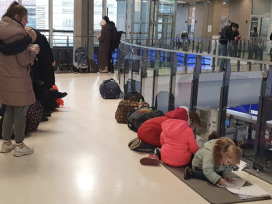Very little information is available to the outside world about the situation for Ukrainians who have remained in the regions occupied by Russia since 24 February 2022. Working from Ukrainian and Russian-language sources, Tatiana Zhurzhenko provides a rare insight on life behind the Russian lines.
The humanitarian situation is dire: basic services, food and medical supplies, and communications infrastructure have all but collapsed. As an example to the rest, local officials, journalists and those suspected of being anti-Russian have been abducted, tortured and worse. Failing that, the loyalty of the population is extorted by blocking humanitarian aid or bought through cash handouts, denominated in roubles of course.
At the symbolic level, there has been a Russification of everyday culture: street names, public advertising, official documents and media have all been ideologically re-aligned, along with the education system from nursery school upwards (in the summer, kids were sent to Crimea for ‘patriotic re-education’).
Those who remain must make impossible choices in the broad spectrum between collaboration and resistance. Though forbidden by Ukrainian law from cooperating with the occupation authorities, ordinary Ukrainian citizens are often left with very little choice.
Although Ukrainian members of the newly installed administrations are often motivated by ideology, collaboration is for the majority more a matter of survival. Business owners, faced with financial ruin, are placed in a particularly impossible position. Unless they concede to pressure to collaborate, they risk being taken over by the occupiers or pro-Russian competitors.
After the liberation of Kherson in November, the wounds left on communities by the occupation regime became visible. A form of transitional justice will be necessary, writes Zhurzhenko, that punishes treason quickly and decisively while remaining mindful of the dilemmas faced by ordinary people.
Ukrainian music at war
The history of Ukrainian music, like the history of the Ukrainian nation, is one of thwarted beginnings and violently interrupted rebirths. Music journalist Sergii Cane places Ukrainian popular music’s current struggle for survival in a long line of resistance to Russian attacks on the nation’s musical culture.
From the Stalinist persecution of the Kobzars – travelling folk musicians to the suffocation of the 1960’s Ukrainian ethno-funk renaissance and the Russification of the pop market after independence, Ukraine’s musical traditions have been repeatedly threatened with oblivion.
Today is no different, as the new wave of Ukrainian musicians to emerge since 2014 are all too aware, writes Cane: ‘All Ukrainian musicians not serving in the army themselves are helping it in any way they can, by collecting money and buying cars, radios, first-aid kits and uniforms. They know that not just their own survival, but the survival of Ukrainian music is at stake.’
And there is more on resistance in this weeks’ round–up of Eurozine articles: look out especially for Halleh Ghorashi on women’s rights activism in Iran and its global support via the Iranian diaspora; Olivér Pilz on the teachers’ strikes in Hungary, which pose perhaps the most serious challenge to Orbán yet; and our very own Alessio Guissani on the historical roots of the surveillance scandal rocking Greece – and by extension the EU.






